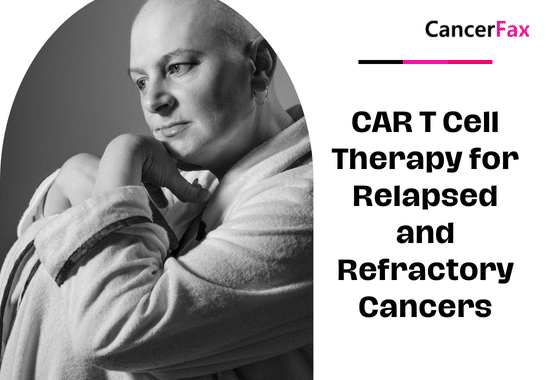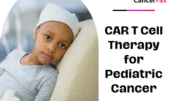CAR T Cell Therapy for Relapsed and Refractory Cancers
Introduction
Relapsed and refractory cancers are highly challenging for treatment due to their general resistance to most standard therapies. These cases represent an area of enormous unmet need in oncology. Recently, one of the most hopeful options for patients with relapsed or refractory cancers in which traditional treatments have failed has been CAR T cell therapy. This paper describes the application of CAR T-cell therapy in relapsed/refractory cancers, covering successes, challenges, and future directions for these patients.
Understanding Relapsed and Refractory Cancers
Definitions:
- Relapsed Cancer: Cancer that returns after a period of remission.
- Refractory Cancer: Cancer that does not respond to treatment or continues to progress despite therapy.
Challenges:
- Treatment Resistance: These cancers often develop resistance to multiple lines of therapy, making them difficult to treat.
- Heterogeneity: Tumor heterogeneity can lead to variable responses to treatment within the same tumor.
CAR T Cell Therapy for Relapsed and Refractory Hematologic Malignancies
Success Stories and Case Studies:
- B-cell Malignancies: CAR T cell therapy targeting CD19 has shown remarkable success in treating relapsed and refractory B-cell malignancies, such as acute lymphoblastic leukemia (ALL) and diffuse large B-cell lymphoma (DLBCL).
- FDA Approvals: Kymriah (tisagenlecleucel) and Yescarta (axicabtagene ciloleucel) are FDA-approved CAR T cell therapies for these indications.
- Clinical Outcomes: Clinical trials have demonstrated high response rates, with many patients achieving complete remission. For instance, in the ZUMA-1 trial, Yescarta achieved an overall response rate of 82% in refractory DLBCL.
Mechanism of Action:
- Target Antigen: CD19 is a protein expressed on the surface of B cells, making it an ideal target for CAR T cell therapy.
- Immune Response: The engineered CAR T cells recognize and bind to CD19, leading to the activation, proliferation, and cytotoxic action of the CAR T cells against the cancer cells.
Challenges and Limitations:
- Antigen Escape: Some cancer cells may lose the expression of the target antigen, leading to relapse.
- Side Effects: Severe side effects, such as cytokine release syndrome (CRS) and neurotoxicity, are common and require careful management.
CAR T Cell Therapy for Relapsed and Refractory Solid Tumors
Current Research and Clinical Trials:
- Glioblastoma: EGFRvIII-targeted CAR T cells have been tested in relapsed glioblastoma with some success, though challenges remain due to the blood-brain barrier and the immunosuppressive tumor microenvironment.
- Pancreatic Cancer: Mesothelin-targeted CAR T cells are being explored in relapsed pancreatic cancer, showing early promise in clinical trials.
Challenges:
- Tumor Microenvironment: Solid tumors have a dense stroma and immunosuppressive environment that hinder CAR T cell infiltration and efficacy.
- Antigen Heterogeneity: The variable expression of target antigens within solid tumors complicates the design of effective CAR T cells.
Strategies to Overcome Challenges
Managing Side Effects:
- Cytokine Release Syndrome (CRS): CRS can be life-threatening and is managed with supportive care, corticosteroids, and tocilizumab.
- Neurotoxicity: Neurotoxicity is managed with supportive care and corticosteroids, with severe cases requiring more intensive interventions.
Addressing Antigen Escape and Relapse:
- Dual-Targeting CARs: CAR T cells targeting multiple antigens can help prevent antigen escape. For example, CAR T cells targeting both CD19 and CD22 are being explored.
- Next-Generation CARs: Enhanced CAR designs with better persistence and efficacy are being developed to reduce the likelihood of relapse.
Enhancing Efficacy in Solid Tumors:
- Armored CAR T cells: Engineering CAR T cells to secrete cytokines or express costimulatory molecules can help overcome the immunosuppressive tumor microenvironment.
- Combining Therapies: Combining CAR T cell therapy with other treatments, such as chemotherapy, radiation, or immune checkpoint inhibitors, can enhance efficacy in solid tumors.
LIST OF CAR T CELL THERAPIES AVAILABLE IN THE MARKET WITH THEIR PRICE IN RESPECTIVE COUNTRIES (USD)
|
||||||
| S.No. | CAR T-Cell therapy | Brand Name | Company | Disease | Country | Cost |
| 1 | Tisagenlecleucel | Kymriah | Novartis | BALL / Lymphoma | USA | 500-800,000 |
| Singapore | 400-500,000 | |||||
| South-Korea | 400-500,000 | |||||
| China | 400-500,000 | |||||
| Australia | 400-500,000 | |||||
| Israel | 400-500,000 | |||||
| 2 | Idecabtagene vicleucel | ABECMA® | BMS | Multiple-Myeloma | USA | 500-800,000 |
| Singapore | 400-500,000 | |||||
| South-Korea | 400-500,000 | |||||
| China | 400-500,000 | |||||
| Australia | 400-500,000 | |||||
| Israel | 400-500,000 | |||||
| 3 | Lisocabtagene maraleucel | BREYANZI® | BMS | DLBCL | USA | 500-800,000 |
| Singapore | 400-500,000 | |||||
| South-Korea | 400-500,000 | |||||
| China | 300-400,000 | |||||
| Australia | 400-500,000 | |||||
| Israel | 400-500,000 | |||||
| 4 | Ciltacabtagene autoleucel | CARVYKTITM | Janssen Biotech (J&J) | Multiple-Myeloma | USA | 500-800,000 |
| Singapore | 400-500,000 | |||||
| South-Korea | 400-500,000 | |||||
| China | 250-300,000 | |||||
| Australia | 400-500,000 | |||||
| Israel | 400-500,000 | |||||
| 5 | Axicabtagene ciloleucel | YESCARTATM | Kite Pharma | DLBCL | USA | 500-800,000 |
| Singapore | 400-500,000 | |||||
| South-Korea | 400-500,000 | |||||
| China | 250-300,000 | |||||
| Australia | 400-500,000 | |||||
| Israel | 400-500,000 | |||||
| 6 | Equecabtagene Autoleucel | FUCASO | IASO Biotechnology | Multiple-Myeloma | China | 250-300,000 USD |
| USA | 500-800,000 | |||||
| 7 | Zevorcabtagene autoleucel | Zevor-Cel | Carsgen | Multiple-Myeloma | China | 250-300,000 USD |
| USA | 500-800,000 | |||||
| 8 | CAR T Cell therapy | Trials | Multiple companies | BALL | China | 75-90,000 |
| DLBCL | China | 75-90,000 | ||||
| Multiple Myeloma | China | 75-90,000 | ||||
| Auto-immune disorders | China | 75-90,000 | ||||
| TALL | China | 75-90,000 | ||||
| 9 | CAR T Cell therapy | NexCAR19 | Immunoact | BALL / DLBCL | India | 60,000 |
Future Directions
Next-Generation CAR T Cells:
- Improved Design: Next-generation CARs with enhanced signaling domains and safety features are being developed to improve efficacy and reduce toxicity.
- Universal CAR T Cells: Off-the-shelf CAR T cells that do not require patient-specific modifications are being explored to improve accessibility and reduce costs.
Combination Therapies:
- Synergistic Approaches: Combining CAR T cell therapy with other treatments, such as checkpoint inhibitors, chemotherapy, or radiation, may enhance efficacy and overcome resistance.
- Immune Modulation: Strategies to modulate the immune system, such as using oncolytic viruses or drugs that deplete immunosuppressive cells, are being investigated to improve CAR T cell function.
Expanding Applications:
- Solid Tumors: Research is ongoing to adapt CAR T cell therapy for solid tumors by identifying suitable targets and overcoming the unique challenges posed by the tumor microenvironment.
- Other Diseases: Beyond cancer, CAR T cells are being explored for the treatment of infectious diseases and autoimmune disorders, demonstrating the versatility of this therapeutic approach.
Conclusion
CAR T cell therapy is, therefore, a very promising approach to the treatment of relapsed or refractory cancers. It has given new hope to patients who have reached the end of life with other therapies. Though challenges still remain, research in this area is continuous, and innovative strategies are being worked out to improve the efficacy and safety of this therapy.
A bright future for CAR T cell therapy lies ahead in the realm of outcome improvement and durable remissions for more diversified patient populations in relapsed or refractory cancers. As the field continues to move forward, so does CAR T cell therapy, shining as an example of how strong immunotherapy can be against cancer, offering new hopes to patients with otherwise incurable malignancies.
Susan Hau is a distinguished researcher in the field of cancer cell therapy, with a particular focus on T cell-based approaches and cancer vaccines. Her work spans several innovative treatment modalities, including CAR T-cell therapy, TIL (Tumor-Infiltrating Lymphocyte) therapy, and NK (Natural Killer) cell therapy.
Hau's expertise lies in cancer cell biology, where she has made significant contributions to understanding the complex interactions between immune cells and tumors.
Her research aims to enhance the efficacy of immunotherapies by manipulating the tumor microenvironment and exploring novel ways to activate and direct immune responses against cancer cells.
Throughout her career, Hau has collaborated with leading professors and researchers in the field of cancer treatment, both in the United States and China.
These international experiences have broadened her perspective and contributed to her innovative approach to cancer therapy development.
Hau's work is particularly focused on addressing the challenges of treating advanced and metastatic cancers. She has been involved in clinical trials evaluating the safety and efficacy of various immunotherapy approaches, including the promising Gamma Delta T cell therapy.
- Comments Closed
- August 8th, 2024






Advanced cancer options, CAR-T cell breakthrough treatment, CAR-T for resistant tumors, CAR-T for treatment-resistant cancers, CAR-T therapy for relapsed cancer, Last-resort cancer therapy, Refractory cancer treatment, Salvage immunotherapy
With a proven success rate exceeding 90%, we offer cutting-edge, state-of-the-art, cost-effective CAR T-cell therapy for all types of cancer.
Please share your medical records via WhatsApp or email us at info@cancerfax.com to receive a detailed treatment plan and cost estimate.
Chat with Susan to learn more >